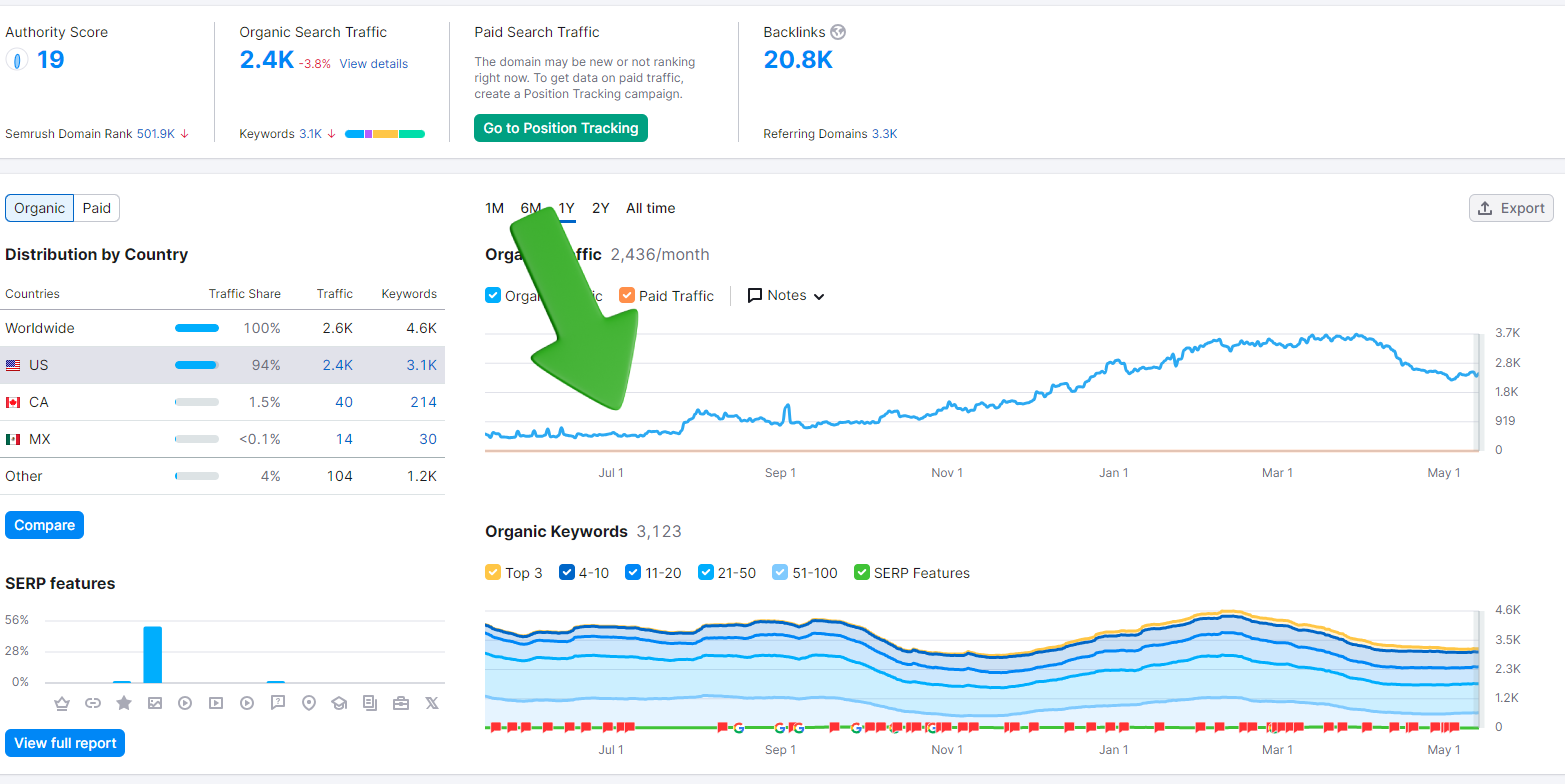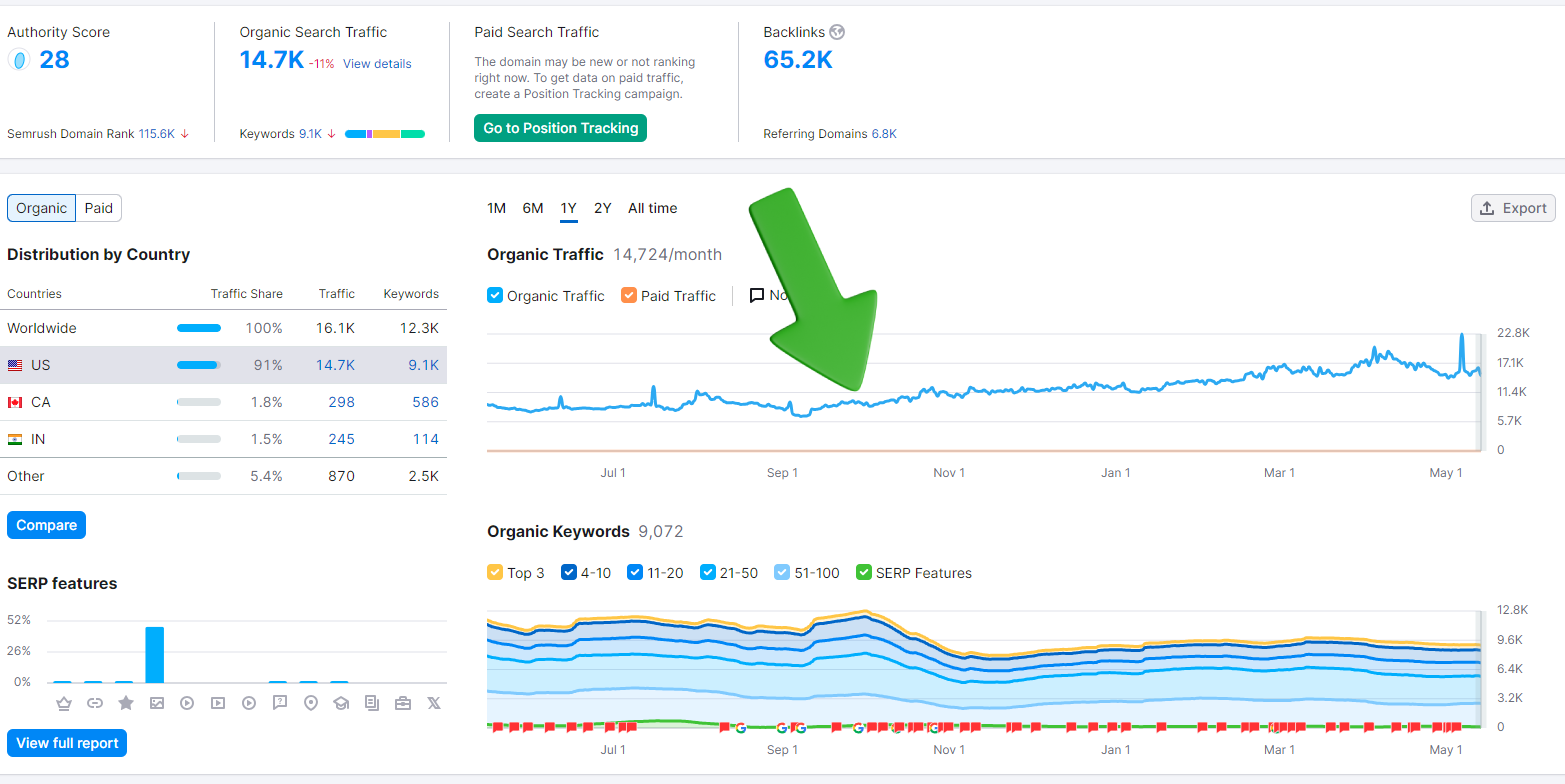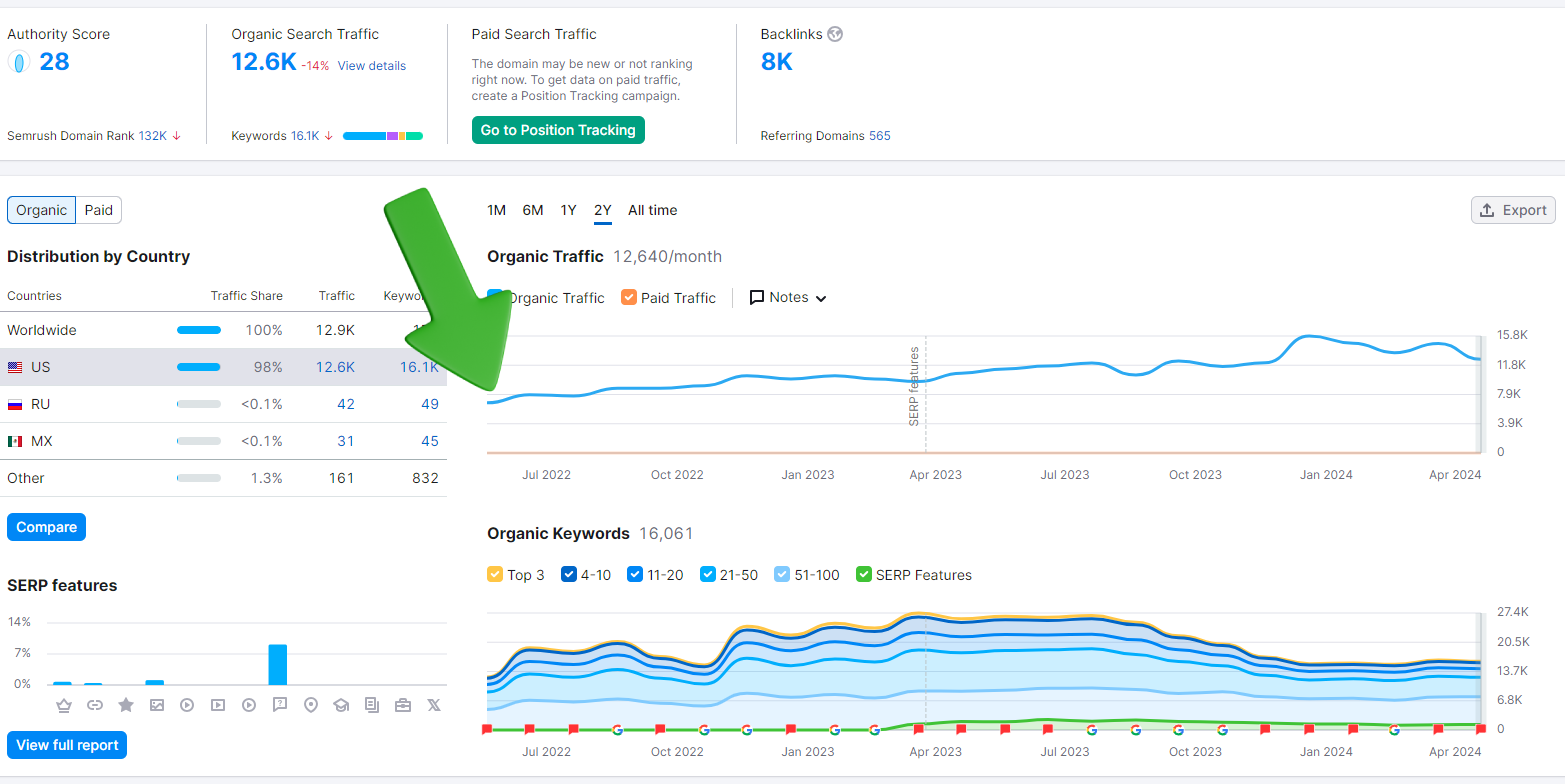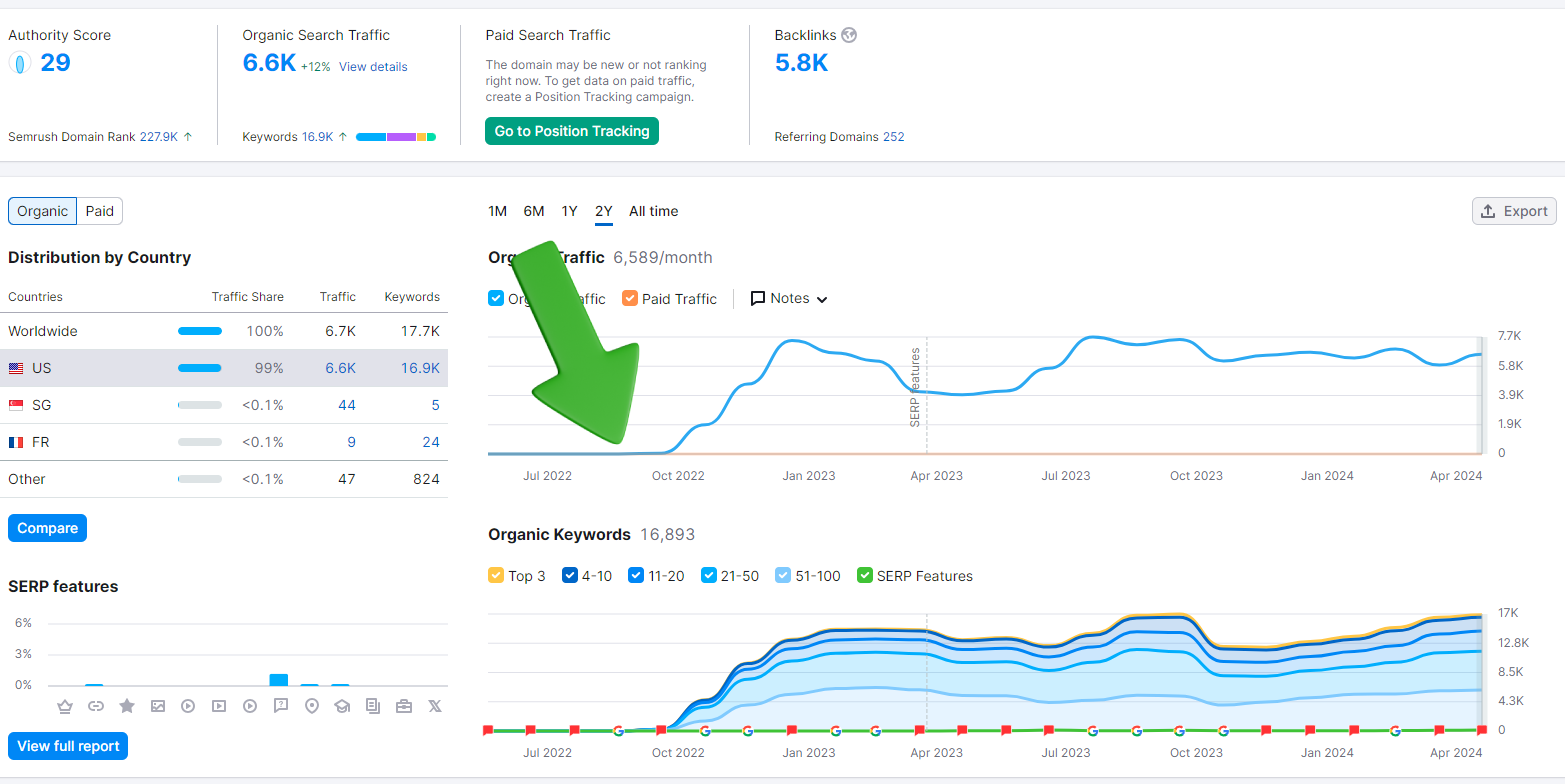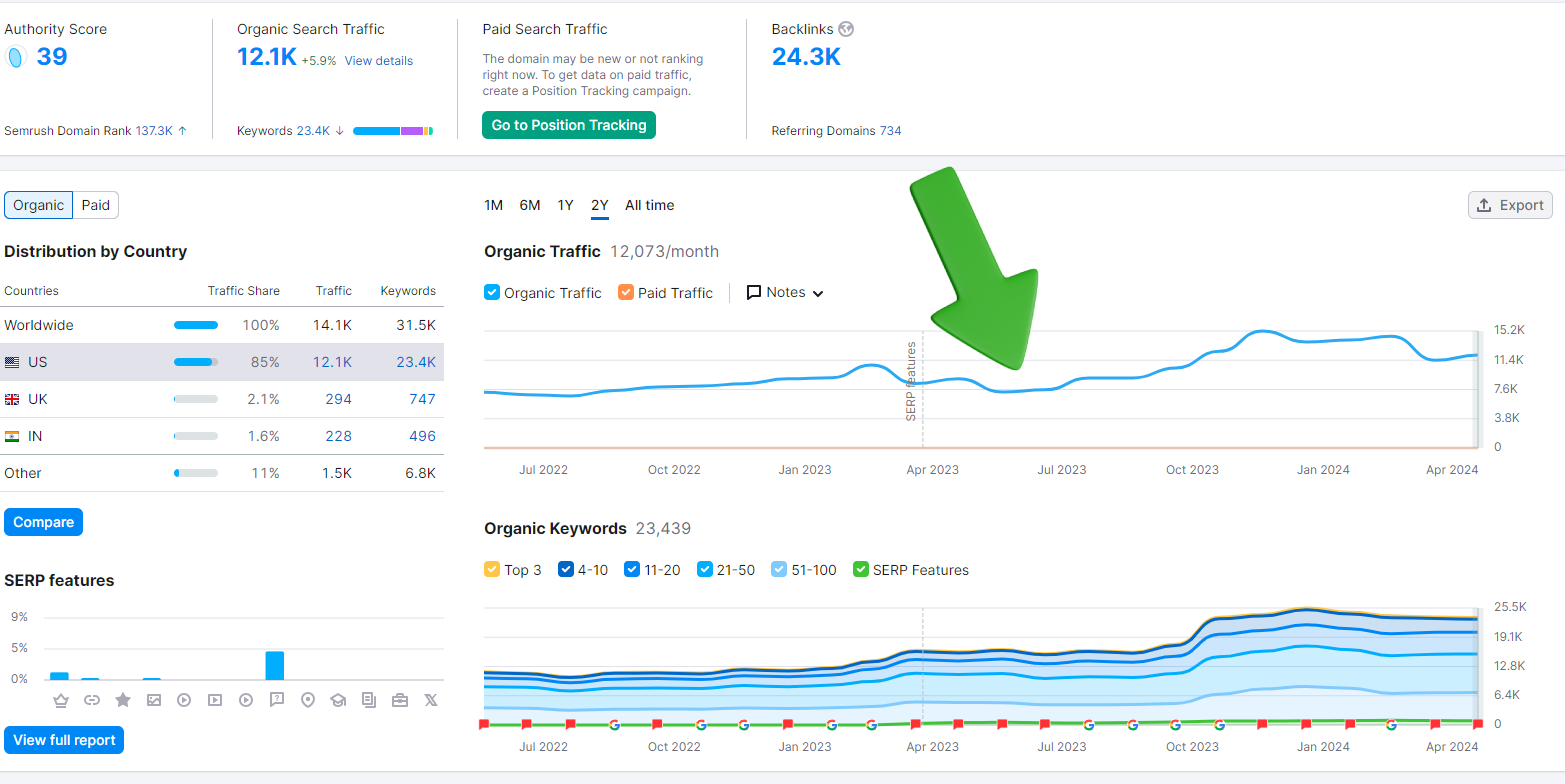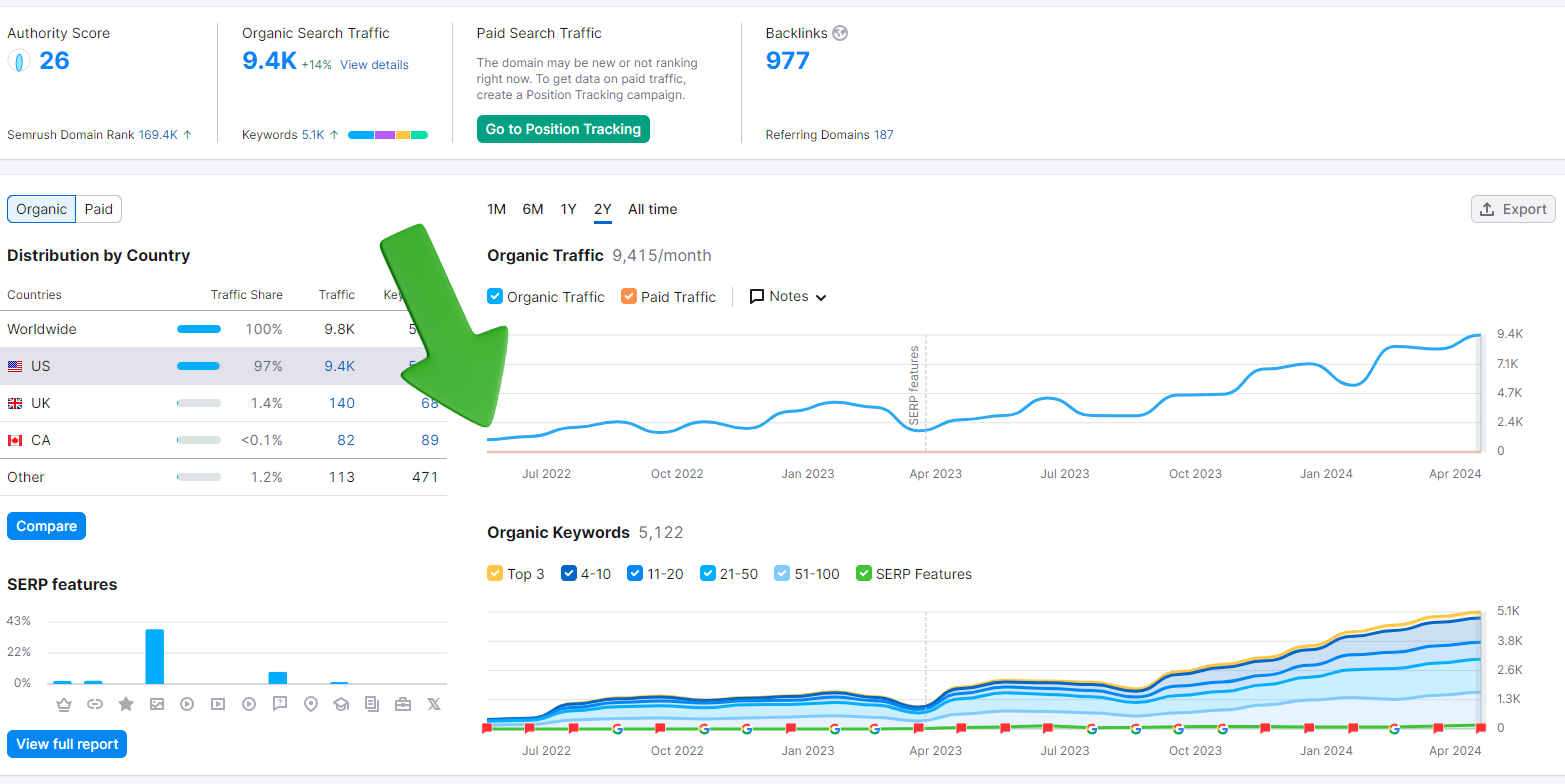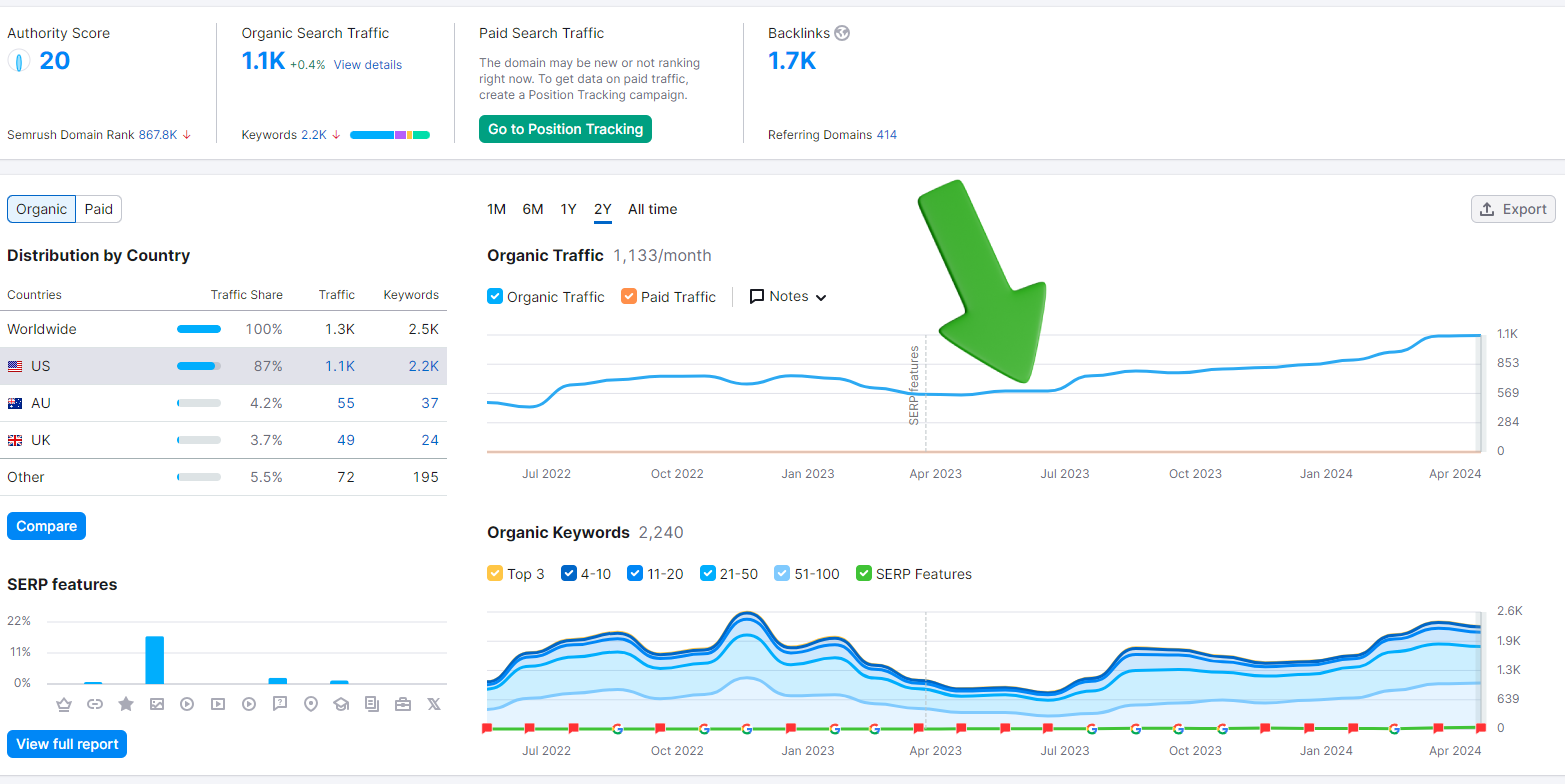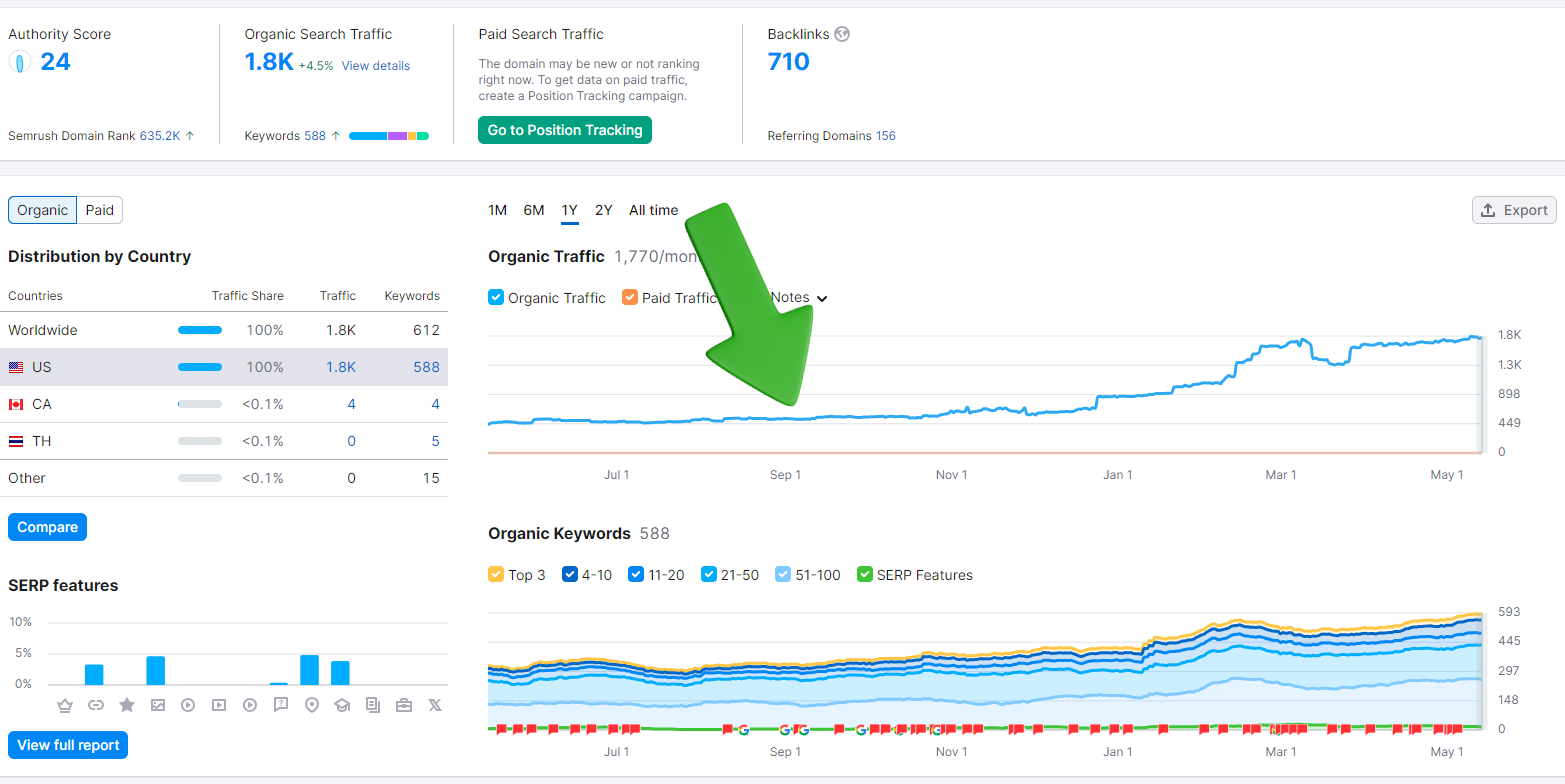Tech Blog Traffic Increase by x5
Client Profile
Client Type: Technology Blog
Service Provided: Fully Managed SEO
Service Cost: $500 per month
Service Start Date: July 2023
Problem Statement
The client, a technology blog, was facing challenges with low organic traffic and limited reader engagement. Despite having high-quality content, their website lacked visibility on search engines, resulting in a smaller audience and less interaction with their blog posts.
Proposed Solution
Tech-focused Keyword Research
- Conducted extensive keyword research to identify high-traffic, relevant keywords related to technology and blogging.
- Focused on both short-tail and long-tail keywords to capture a wider audience.
Optimizing Blog Posts
- Enhanced blog posts with targeted keywords while maintaining readability and appeal.
- Included detailed explanations, tech tips, and case studies to add value for readers.
Improving Site Structure
- Optimized site architecture for better navigation and user experience.
- Implemented internal linking strategies to help search engines crawl and index the site more effectively.
Execution of the SEO Strategy
Keyword Implementation
- Seamlessly integrated selected keywords into blog content, category pages, and technical guides.
- Developed keyword-rich content such as tutorials, tech news updates, and product reviews to attract and engage visitors.
Technical SEO Enhancements
- Resolved technical SEO issues like broken links, duplicate content, and slow page loading speeds.
- Implemented structured data markup to enhance search engine understanding of blog content and tech articles.
Content Creation and Distribution
- Produced high-quality content including industry trends, in-depth reviews, and tech comparisons.
- Promoted content through social media channels and email newsletters to drive traffic and engagement.
Tangible Results 
Organic Traffic Growth
Organic search traffic increased to 3K visits per month, reflecting significant improvement.
Website ranked higher for competitive tech keywords, driving more qualified traffic.
Increased Reader Engagement
Noticeable boost in reader engagement and interaction due to enhanced website visibility and user experience.
Higher engagement with content leading to increased time spent on site and lower bounce rates.
Budget and Timeline
Budget: $500 per month
Timeline: July 2023 – Present
Conclusion
The fully managed SEO service successfully transformed the client’s online presence, making their technology blog a go-to destination for tech enthusiasts. By implementing strategic keyword optimization, improving blog posts, and enhancing site structure, the client experienced substantial growth in organic traffic and reader engagement, achieving impressive results within the specified budget and timeline.
E-commerce Fashion Retailer Traffic Increase by +70%
Client Profile
Client Type: Online Fashion Store
Service Provided: Fully Managed SEO
Service Cost: $1000 per month
Service Start Date: October 2023
Problem Statement
The client, an online fashion store, faced challenges in driving organic traffic and converting visitors into sales. Despite having a wide range of trendy products, their website struggled with poor visibility on search engines, leading to low traffic and suboptimal sales performance.
Proposed Solution
Keyword Optimization
- Conducted in-depth keyword research to identify high-traffic, relevant fashion-related keywords.
- Optimized product pages, category pages, and blog content with targeted keywords.
Site Architecture Improvement
- Restructured the website’s architecture to improve crawlability and user experience.
- Implemented internal linking strategies to enhance the distribution of link equity across the site.
Mobile Optimization
- Enhanced mobile responsiveness to ensure seamless shopping experiences on all devices.
- Optimized mobile site speed to reduce bounce rates and improve user engagement.
Execution of the SEO Strategy
Keyword Implementation
- Integrated selected keywords naturally into product descriptions, meta tags, and headings.
- Created keyword-focused blog content to attract and engage fashion-savvy audiences.
Technical SEO Enhancements
- Addressed technical SEO issues such as broken links, duplicate content, and slow-loading pages.
- Implemented structured data markup to improve search engine understanding of product information.
Content Creation and Distribution
- Developed high-quality, engaging content including fashion tips, style guides, and trend reports.
- Promoted content through social media channels and email newsletters to drive traffic and engagement.
Tangible Results
Organic Traffic Growth
- Organic search traffic increased to 14.7K visits per month, a significant improvement.
- Website ranked higher for competitive fashion keywords, driving more qualified traffic.
Increased Sales
- Noticeable boost in online sales and conversion rates due to enhanced website visibility and user experience.
- Higher engagement with content leading to increased time spent on site and lower bounce rates.
Budget and Timeline
Budget: $1000 per month
Timeline: October 2023 – Present
Conclusion
The fully managed SEO service effectively transformed the client’s online presence, positioning their fashion store as a go-to destination for trendy apparel. By implementing strategic keyword optimization, improving site architecture, and enhancing mobile performance, the client experienced substantial growth in organic traffic and sales, achieving impressive results within the specified budget and timeline.
Financial Advisory Firm Increase Traffic by +100%
Client Profile
Client Type: Financial Advisory Firm
Service Provided: Fully Managed SEO
Service Cost: $1000 per month
Service Start Date: July 2022
Problem Statement
The client, a financial advisory firm, struggled to attract website traffic and generate client consultations. Despite having valuable financial content, their online presence was weak, limiting their potential to reach and engage with prospective clients.
Proposed Solution
Keyword Optimization
- Conducted comprehensive keyword research to identify high-potential financial-related keywords.
- Optimized website content, meta tags, and headings with targeted keywords.
Content Marketing Strategy
- Developed a content calendar featuring informative articles, guides, and case studies relevant to financial advisory.
- Ensured content was optimized for search engines and user intent.
Backlink Building
- Implemented a strategic backlink building campaign to improve domain authority.
- Partnered with reputable financial websites and blogs for guest posting and mentions.
Execution of the SEO Strategy
Keyword Implementation
- Targeted both short-tail and long-tail keywords related to financial advisory services.
- Continuously monitored and adjusted keyword strategies based on performance analytics.
Technical SEO Enhancements
- Fixed website errors, optimized site speed, and ensured mobile-friendliness.
- Implemented structured data to enhance search engine understanding of the content.
Content Creation and Distribution
- Produced high-quality content that addressed common financial questions and provided value to readers.
- Distributed content through social media and email marketing to drive traffic and engagement.
Tangible Results
Organic Traffic Growth
- Steady growth in organic traffic over the period of the campaign.
- Website ranked higher for competitive financial advisory keywords.
Increased Client Consultations
- Significant rise in client consultations and inquiries through the website.
- Enhanced brand visibility and authority in the financial advisory sector.
Budget and Timeline
Budget: $1000 per month
Timeline: July 2022 – Present
Conclusion
The fully managed SEO service greatly enhanced the client’s online visibility, positioning them as a leading financial advisory firm. Through targeted keyword optimization, strategic content marketing, and robust backlink building, the client experienced substantial growth in organic traffic and client consultations, achieving impressive results within the specified budget and timeline.
Nutrition Blog Growth Trafic Increase by +40%
Client Profile
Client Type: Food Nutrition
Service Provided: Fully Managed SEO
Service Cost: $250 per month
Service Start Date: February 2024
Problem Statement
The client, a food nutrition blog focused on cooking, faced challenges in growing their readership and increasing recipe shares. Despite high-quality content, their online visibility was limited, affecting user engagement and traffic.
Proposed Solution
Content Optimization
- Analyzed existing recipe posts and identified areas for keyword optimization.
- Enhanced meta tags, descriptions, and alt text for images to target relevant keywords.
- Implemented internal linking strategies to improve site navigation and authority.
Content Marketing Strategy
- Developed a content calendar focusing on diverse recipe posts, step-by-step guides, and high-quality images.
- Created engaging content that caters to user intent and popular search queries.
High-Quality Content Creation
- Collaborated with food nutrition experts to produce informative and appealing content.
- Focused on creating visually appealing posts with high-quality images and detailed instructions.
Execution of the SEO Strategy
Keyword Implementation
- Targeted both short-tail and long-tail keywords relevant to cooking and food nutrition.
- Regularly monitored rankings and adjusted keyword usage based on performance.
Technical SEO Enhancements
- Fixed crawl errors, optimized site speed, and ensured mobile responsiveness.
- Implemented structured data markup for recipes to enhance visibility in search results.
Link Building and Outreach
- Built high-quality backlinks from reputable food and nutrition websites.
- Collaborated with influencers and bloggers for guest posts and mentions.
Tangible Results
Organic Traffic Growth
- Within 3 months, organic traffic increased by 39%.
- The website ranked higher for competitive cooking-related keywords.
Enhanced User Engagement
- Increased reader interaction and recipe shares on social media platforms.
- Improved bounce rate and average session duration.
Budget and Timeline
Budget: $250 per month
Timeline: 3 months (February 2024 – April 2024)
Conclusion
The fully managed SEO service significantly enhanced the client’s online presence, positioning their cooking blog as a trusted resource in the food nutrition industry. Through targeted content optimization, strategic content marketing, and technical SEO enhancements, the client achieved remarkable growth in organic traffic and user engagement within a specified budget and timeline.
Nonprofit Organizations From 0 to 6500 Monthly
Client Profile
- Client Type: Nonprofit Organization
- Service Provided: Fully Managed SEO
- Service Cost: $1000 per month
- Service Start Date: September 2022
Problem Statement
The nonprofit organization faced challenges in gaining online visibility for their fundraising and awareness campaigns. Despite their efforts, their website was not attracting sufficient organic traffic to make a significant impact. The goal was to enhance search visibility and drive more traffic to support their initiatives.
Proposed Solution
Keyword Research and On-Page Optimization
- Conducted comprehensive keyword research to identify terms relevant to the nonprofit sector and their specific causes.
- Optimized meta tags, headings, and content on key pages to target identified keywords effectively.
- Improved internal linking structure to boost page authority and user experience.
Community-Focused Content Strategy
- Developed a content plan focused on creating engaging and informative content for the community.
- Produced blog posts, articles, and case studies that highlight success stories, volunteer opportunities, and fundraising events.
- Implemented long-form content to establish authority and provide valuable information to supporters and potential donors.
Technical SEO Enhancements
- Fixed crawl errors, optimized site speed, and ensured mobile responsiveness to improve overall site performance.
- Implemented structured data markup to enhance search engine understanding and visibility of content.
Execution of the SEO Strategy
Keyword Implementation
- Targeted both short-tail and long-tail keywords relevant to the nonprofit’s mission and campaigns.
- Regularly monitored keyword performance and adjusted strategies to optimize results.
Link Building and Outreach
- Secured high-quality backlinks from reputable sites within the nonprofit and community sectors.
- Collaborated with influencers and bloggers to promote fundraising events and campaigns.
Tangible Results
Organic Traffic Surge
- Within 6 months, organic traffic increased to 7.6K monthly visitors.
- The website achieved higher rankings for competitive keywords related to their campaigns, resulting in increased visibility.
Increased Engagement and Support
- Significant increase in online donations and volunteer sign-ups.
- Enhanced community engagement through informative and impactful content.
Budget and Timeline
- Budget: $1000 per month
- Timeline: 6 months (September 2022 to janvier 2023)
Conclusion
Our fully managed SEO service significantly enhanced the online presence of the nonprofit organization, driving more traffic and increasing engagement for their fundraising and awareness campaigns. By implementing targeted keyword strategies, optimizing on-page elements, and creating community-focused content, we achieved substantial results within the specified budget and timeline.
E-commerce Home Goods Store Increase Traffic by x2
Client Profile
- Client Type: Online Home Goods Store
- Service Provided: Fully Managed SEO
- Service Cost: $1000 per month
- Service Start Date: June 2023
Problem Statement
Our client, an online home goods store, was struggling to attract organic traffic and convert visitors into customers. Despite having a diverse range of quality products, their online presence was limited. The objective was to enhance search visibility, drive organic traffic, and boost sales.
Proposed Solution
SEO for Product Pages
- Conducted a thorough analysis of existing product pages.
- Optimized meta tags, product descriptions, and images for high-impact keywords.
- Improved internal linking to enhance page authority and user navigation.
Content Marketing Strategy
- Developed a content plan focusing on home decor tips, product usage guides, and industry trends.
- Created high-quality blog posts and articles to engage and inform potential customers.
- Implemented long-form content to establish the brand as an authority in the home goods niche.
User Experience Enhancement
- Improved website design and navigation to enhance user experience.
- Optimized site speed and mobile responsiveness to meet modern user expectations.
- Ensured a seamless and intuitive shopping experience to reduce bounce rates and increase conversions.
Execution of the SEO Strategy
Keyword Implementation
- Targeted both short-tail and long-tail keywords relevant to home goods and decor.
- Regularly monitored and adjusted keyword usage based on performance data.
Technical SEO Enhancements
- Fixed crawl errors, optimized site speed, and ensured mobile responsiveness.
- Implemented structured data markup for product pages to improve search engine understanding and visibility.
Tangible Results
Organic Traffic Surge
- Within 10 months, organic traffic increased to 12.1K monthly visitors.
- The website ranked higher for competitive home goods-related keywords, resulting in more qualified traffic.
Sales Growth
- Conversion rates improved significantly, leading to increased sales and revenue.
- Enhanced user experience contributed to a higher number of repeat purchases.
Budget and Timeline
- Budget: $1000 per month
- Timeline: 10 months (June 2023 to April 2024)
Conclusion
Our fully managed SEO service effectively transformed the client’s online presence, leading to improved search visibility and significant sales growth. Through targeted SEO for product pages, strategic content marketing, and user experience enhancements, we achieved remarkable results within the specified budget and timeline.
Tech Recruitment Agency From 500 to 10k
Client Profile
- Client Type: Tech Recruitment Agency
- Service Provided: Fully Managed SEO
- Service Cost: $500 per month
- Service Start Date: June 2022
Problem Statement
Our client, a tech recruitment agency, faced challenges in attracting qualified candidates through organic search. Despite their expertise in tech hiring, their online visibility was limited. The goal was to improve search rankings, increase organic traffic, and drive candidate applications through strategic SEO efforts.
Proposed Solution
Keyword Optimization
- Conducted comprehensive keyword research to identify high-impact terms related to tech recruitment.
- Optimized website content, meta tags, and headers with targeted keywords.
Industry-Specific Content
- Created informative blog posts and articles focused on tech recruitment trends and tips.
- Developed detailed guides and whitepapers to attract and engage the target audience.
Backlink Building
- Implemented a backlink strategy to acquire high-quality links from reputable tech and HR websites.
- Engaged in guest posting and collaboration with industry influencers to boost domain authority.
Execution of the SEO Strategy
Keyword Implementation
- Integrated both short-tail and long-tail keywords relevant to tech recruitment throughout the website.
- Regularly monitored and adjusted keyword usage based on performance data.
Technical SEO Enhancements
- Addressed technical SEO issues, including site speed optimization and mobile responsiveness.
- Ensured proper indexing and crawlability of the website by search engines.
Tangible Results
Organic Traffic Growth
- Within 12 months, organic traffic increased to 9.4K monthly visitors (+14%).
- The website achieved higher rankings for competitive tech recruitment-related keywords.
Increased Candidate Applications
- Significant increase in candidate applications due to improved search visibility.
- Enhanced engagement with industry-specific content, leading to more qualified leads.
Budget and Timeline
- Budget: $500 per month
- Timeline: 12 months (June 2022 to June 2023)
Conclusion
Our fully managed SEO service effectively enhanced the client’s online presence, leading to improved search rankings and a significant increase in candidate applications. Through keyword optimization, industry-specific content creation, and strategic backlink building, we achieved remarkable results within the specified budget and timeline.
Interior Designer – Traffic Increase by 110%
Client Profile
- Client Type: Interior Designer
- Service Provided: Blogger Expansion SEO
- Service Cost: $150 per month
- Service Start Date: May 2023
Problem Statement
Our client, an interior designer, sought to expand their online presence to attract more readers and design consultation clients. Despite offering valuable decor tips and DIY projects, the blog struggled with low engagement and limited visibility. The goal was to increase organic traffic, enhance reader interaction, and boost design consultations.
Proposed Solution
Content Strategy
- Developed content focused on decor tips, DIY projects, and style guides.
- Included high-quality images and videos to create visually appealing content.
- Published regular updates to keep the content fresh and engaging.
SEO Optimization
- Optimized blog posts for relevant interior design-related keywords.
- Improved meta tags, headers, and internal linking to boost SEO.
- Enhanced the website’s mobile responsiveness and loading speed.
Reader Engagement Tactics
- Implemented interactive elements such as polls and comment sections to increase engagement.
- Leveraged social media to drive traffic and interaction on the blog.
Execution of the SEO Strategy
Keyword Implementation
- Targeted both short-tail and long-tail keywords relevant to interior design and DIY projects.
- Monitored keyword performance and adjusted strategy based on results.
Technical SEO Enhancements
- Fixed technical issues such as broken links and slow page speed.
- Ensured mobile responsiveness to provide a better user experience.
Tangible Results
Organic Traffic Growth
- Within 12 months, organic traffic increased to 1.1K monthly visitors (+0.4%).
- The blog ranked higher for competitive interior design-related keywords.
Increased Reader Interaction and Consultations
- Enhanced reader interaction through engaging and visually appealing content.
- Increased design consultations, boosting revenue and client satisfaction.
Budget and Timeline
- Budget: $150 per month
- Timeline: 12 months (May 2023 to May 2024)
Conclusion
Our Blogger Expansion SEO service successfully enhanced the client’s interior design blog, resulting in increased visibility, reader interaction, and design consultations. Through targeted content strategies, SEO optimization, and effective engagement tactics, we achieved significant results within the specified budget and timeline.
Real Estate Agency Traffic Increase by 320%
Client Profile
- Client Type: Real Estate Agency
- Service Provided: Fully Managed SEO
- Service Cost: $1000 per month
- Service Start Date: March 2023
Problem Statement
Our client, a real estate agency, aimed to enhance their online presence to attract more leads and increase the visibility of their property listings. Despite having a range of quality properties, their website suffered from low organic traffic and visibility. The goal was to implement local SEO strategies and content marketing to drive organic traffic and boost leads.
Proposed Solution
Local SEO Strategy
- Optimized Google My Business profile with updated information, images, and client reviews.
- Focused on acquiring local backlinks to boost domain authority in targeted areas.
- Included local keywords in meta tags, headers, and content to improve local search rankings.
Property Listings Optimization
- Created detailed and SEO-friendly property listings with high-quality images and descriptions.
- Enhanced internal linking to ensure easy navigation and improved user experience.
Content Marketing
- Developed high-quality content, including blog posts and guides on buying and selling properties.
- Targeted long-tail keywords to capture niche market segments and user intent.
Execution of the SEO Strategy
Keyword Implementation
- Targeted both short-tail and long-tail keywords relevant to real estate and property listings.
- Monitored keyword performance and adjusted strategy based on results.
Technical SEO Enhancements
- Fixed technical issues such as broken links and slow page speed.
- Ensured mobile responsiveness to provide a better user experience.
Tangible Results
Organic Traffic Growth
- Within 12 months, organic traffic increased to 7.1K monthly visitors (+4.5%).
- The website ranked higher for competitive real estate-related keywords.
Increased Leads and Visibility
- Significant increase in leads through enhanced online presence and optimized listings.
- Higher visibility for property listings, resulting in quicker property sales and rentals.
Budget and Timeline
- Budget: $1000 per month
- Timeline: 12 months (March 2023 to March 2024)
Conclusion
Our fully managed SEO service effectively boosted the client’s real estate agency’s online presence, resulting in increased visibility and leads. Through local SEO strategies, property listings optimization, and content marketing, we achieved remarkable results within the specified budget and timeline.
Tech Gadget Blog Increase Traffic x3
Client Profile
- Client Type: Tech Reviewer
- Service Provided: Blogger Expansion SEO
- Service Cost: $100 per month
- Service Start Date: September 2023
Problem Statement
Our client, a tech reviewer, sought to expand their tech gadget blog to attract more readers and secure product sponsorships. Despite offering valuable product reviews and tech news, the blog struggled with low engagement and limited visibility. The goal was to increase organic traffic, enhance reader engagement, and attract product sponsorships.
Proposed Solution
Content Strategy
- Developed content focused on product reviews, comparison articles, and the latest tech news.
- Included high-quality images and videos to create visually appealing content.
- Published regular updates to keep the content fresh and engaging.
SEO Optimization
- Optimized blog posts for relevant tech-related keywords.
- Improved meta tags, headers, and internal linking to boost SEO.
- Enhanced the website’s mobile responsiveness and loading speed.
Product Sponsorship Outreach
- Identified potential tech product companies and reached out for sponsorships.
- Leveraged the blog’s growing audience as a value proposition for partnerships.
Execution of the SEO Strategy
Keyword Implementation
- Targeted both short-tail and long-tail keywords relevant to tech gadgets and reviews.
- Monitored keyword performance and adjusted strategy based on results.
Technical SEO Enhancements
- Fixed technical issues such as broken links and slow page speed.
- Ensured mobile responsiveness to provide a better user experience.
Tangible Results
Organic Traffic Growth
- Within 8 months, organic traffic increased to 1.8K monthly visitors (+4.5%).
- The blog ranked higher for competitive tech-related keywords.
Reader Engagement and Product Sponsorships
- Increased reader interaction through engaging and visually appealing content.
- Secured product sponsorships, boosting credibility and revenue.
Budget and Timeline
- Budget: $100 per month
- Timeline: 8 months (September 2023 to May 2024)
Conclusion
Our Blogger Expansion SEO service successfully enhanced the client’s tech gadget blog, resulting in increased visibility, reader engagement, and valuable product sponsorships. Through targeted content strategies, SEO optimization, and effective outreach, we achieved significant results within the specified budget and timeline.

